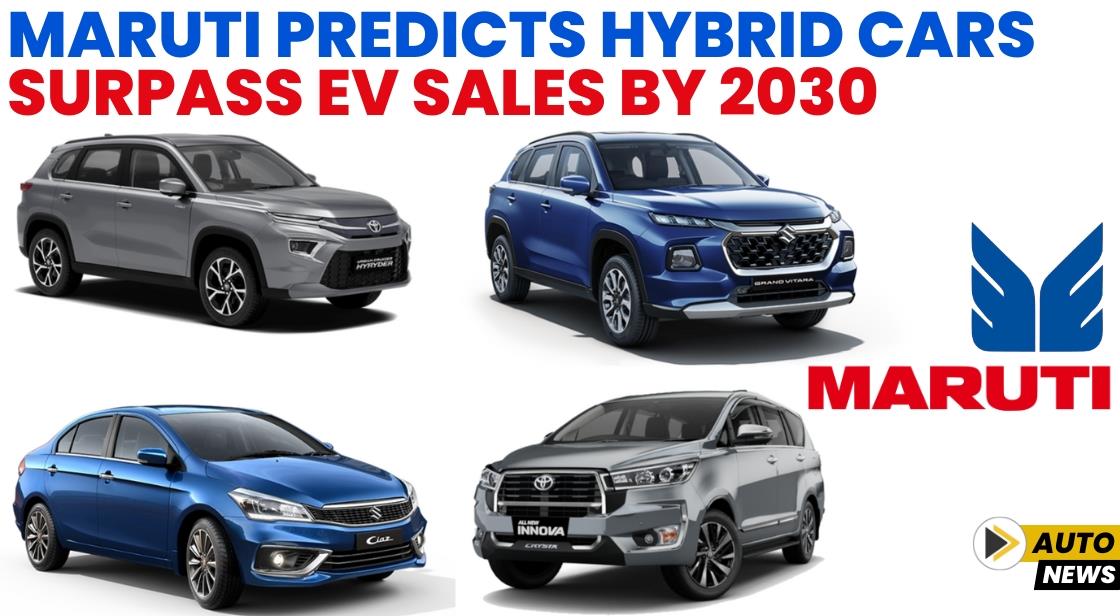Maruti Predicts Hybrid Cars to Surpass EV Sales by 2030

News Synopsis
In a recent interview with Source, a senior executive from Maruti Suzuki revealed that one in every six units of the company’s popular Grand Vitara model sold is already a hybrid. This trend is expected to intensify in the coming years as India's largest automaker predicts a significant shift toward hybrid vehicles. As the demand for hybrid cars grows, Maruti Suzuki foresees hybrid models playing a pivotal role in its future lineup and industry sales overall.
Hybrid Cars to Outpace Electric Vehicles by 2030
Maruti Suzuki projects that by 2030, hybrid vehicles will account for 25% of total car sales in the Indian automotive industry. In contrast, electric vehicles (EVs) are expected to make up just 15% of passenger vehicle sales. This forecast highlights the company's belief that hybrid technology, which blends the benefits of internal combustion engines (ICE) and electric vehicles, will continue to attract consumers.
The company’s leadership is confident that hybrid vehicles offer the best of both worlds: the fuel efficiency and low emissions of electric cars without the range anxiety often associated with EVs. Partho Banerjee, Senior Executive Officer of Maruti Suzuki, emphasized this point during the annual convention of the Society of Indian Automobile Manufacturers (SIAM), noting that 16% of sales for their Grand Vitara and Invicto models now come from hybrid variants.
Regional Incentives Driving Demand for Hybrid Cars
One of the key factors driving the growing popularity of hybrid cars is regional incentives offered by state governments in India. Banerjee pointed out that demand for hybrid vehicles is particularly strong in states that provide tax benefits or other incentives for purchasing these eco-friendly cars. These incentives are making hybrid vehicles a more attractive option for consumers, particularly in areas where infrastructure for fully electric cars is still developing.
Debate Over Incentives for Hybrid Vehicles
The growing demand for hybrid cars comes at a time when there is an ongoing debate within both the Indian government and the automotive industry about whether to offer more incentives for hybrid vehicles. Currently, the focus has been on promoting electric vehicles to reduce emissions, but industry leaders like Maruti Suzuki are advocating for hybrid cars to receive similar tax breaks and incentives.
Banerjee noted that both hybrid and electric vehicles are poised for growth in India’s rapidly evolving automotive market. He also mentioned that Maruti Suzuki is preparing to launch its own electric vehicle at the upcoming Auto Expo, reflecting the company’s commitment to embracing both technologies.
Maruti Suzuki’s Inventory and Festive Season Demand
As Maruti Suzuki prepares for the festive season, the company has been adjusting its production and distribution strategies. Over the past two months, Maruti Suzuki has been calibrating its production levels and now has 36 days of inventory in its dealer network across India. This ensures that the company is well-positioned to meet consumer demand during key festive periods like Onam and Navratri.
Banerjee highlighted the positive sales performance during these festive periods, noting an 11% growth in bookings in Kerala ahead of Onam and a 10% year-on-year (YoY) increase in car deliveries during Ganesh Chaturthi. These figures underscore the resilience of consumer demand in the Indian automobile market, even in a challenging economic environment.
Maruti Suzuki's Outlook on Industry Growth
Despite some concerns about the broader economic landscape, Maruti Suzuki remains optimistic about the long-term growth potential of the Indian automotive sector. The company is investing in new plant capacity to accommodate future demand and is preparing for sustained growth over the coming years. This investment in infrastructure demonstrates Maruti’s commitment to maintaining its leadership position in the Indian market.
Festive Discounts and Customer Demand
Banerjee also pointed out that the current festive season is offering customers some of the best discounts the industry has ever seen. However, he urged buyers to act quickly, as these discounts may not last long. Maruti Suzuki, along with other car manufacturers, is offering high discounts to attract buyers during this peak sales period, making it an opportune time for consumers to make their purchase decisions.
Conclusion: A Hybrid-Focused Future
In conclusion, Maruti Suzuki’s outlook for the future of hybrid cars in India is clear. With rising consumer demand, government incentives, and the company's own efforts to expand its hybrid offerings, Maruti expects hybrid vehicles to become a significant portion of the automotive market by 2030. While electric vehicles are also set to grow, the company believes that hybrid cars will outpace EVs due to their versatility, fuel efficiency, and the lack of infrastructure challenges that EVs face.
As Maruti Suzuki continues to innovate and expand its product offerings, the company is positioning itself for success in a rapidly changing automotive landscape. With investments in new plant capacity and a focus on both hybrid and electric technologies, Maruti is preparing for sustained growth in the years to come. As consumers benefit from festive discounts and favorable market conditions, Maruti Suzuki remains confident in the long-term strength of the Indian automotive industry.









